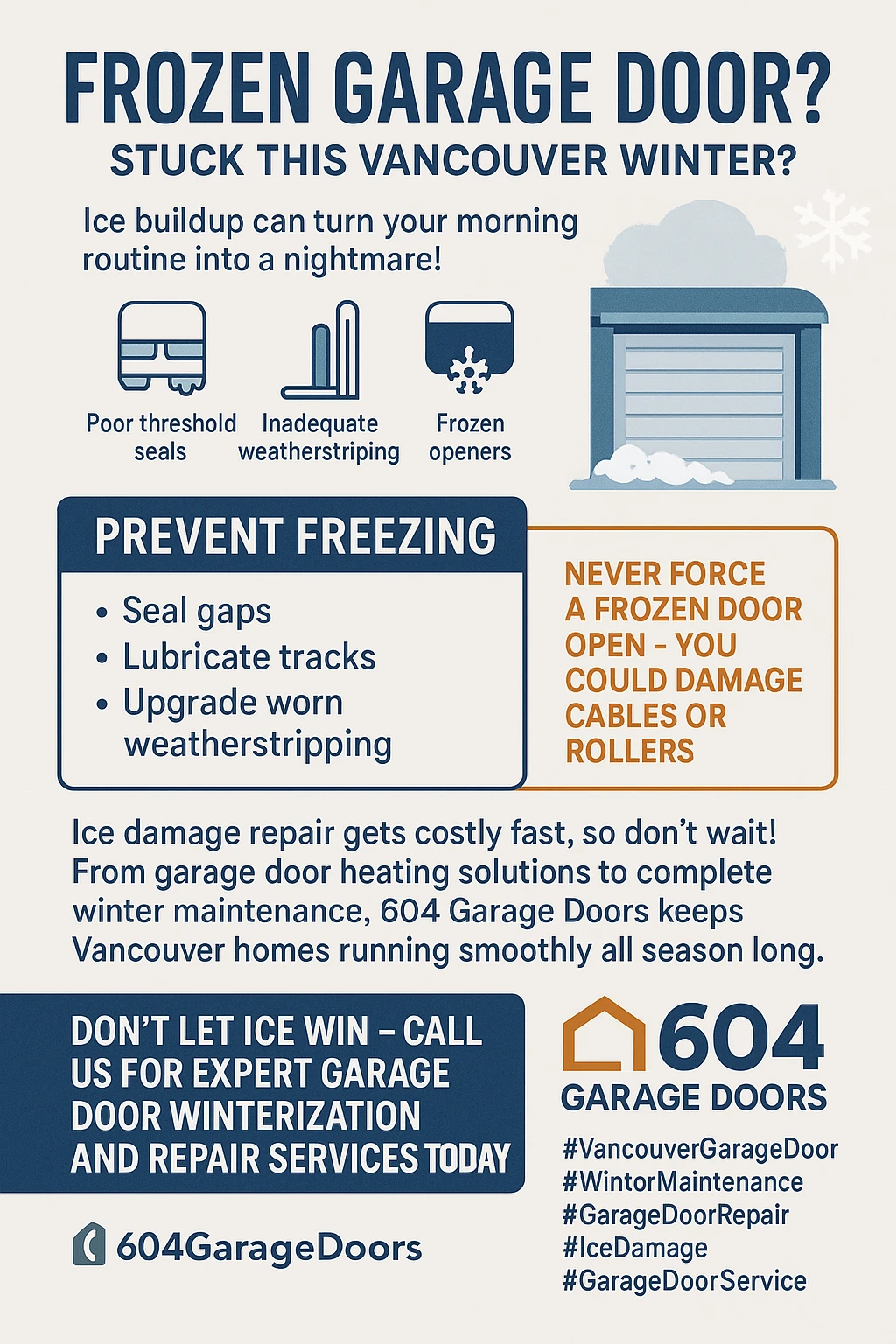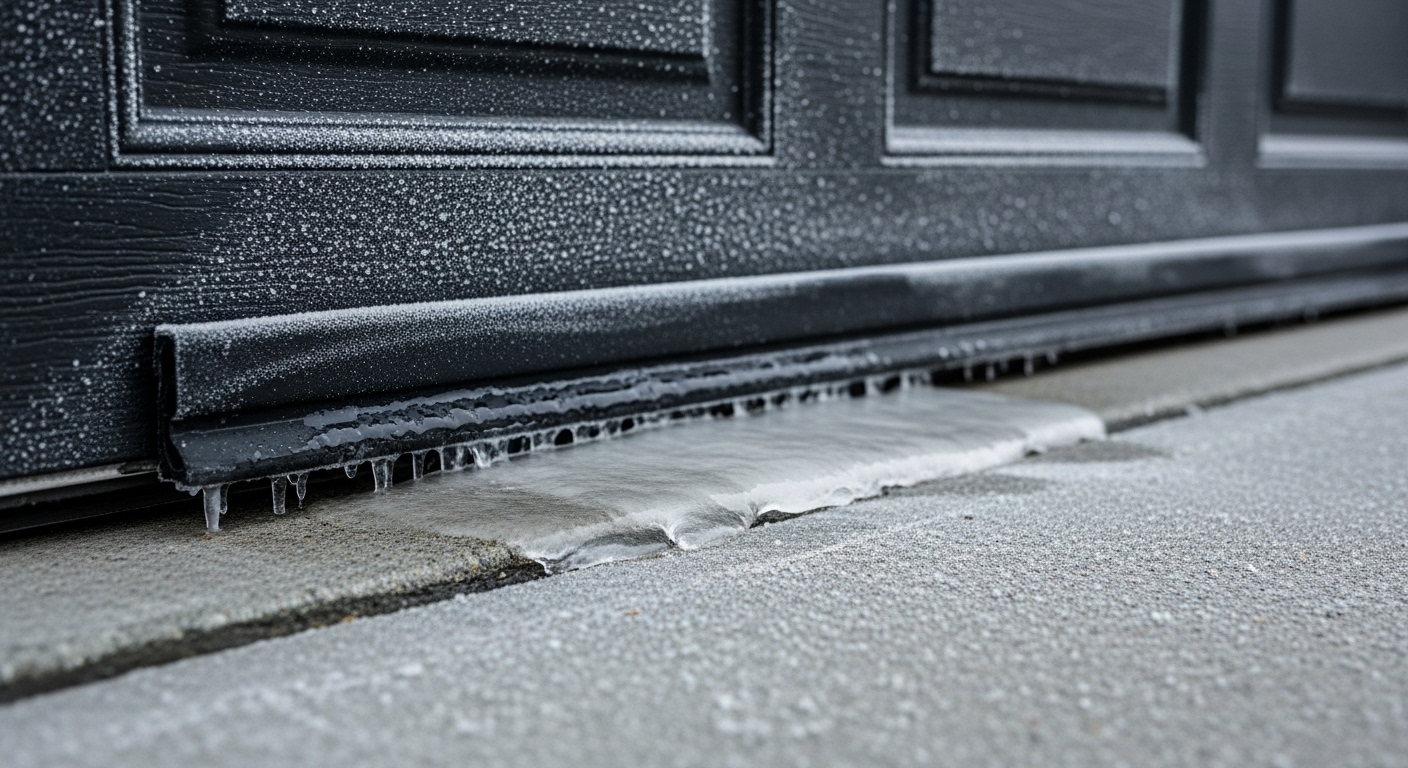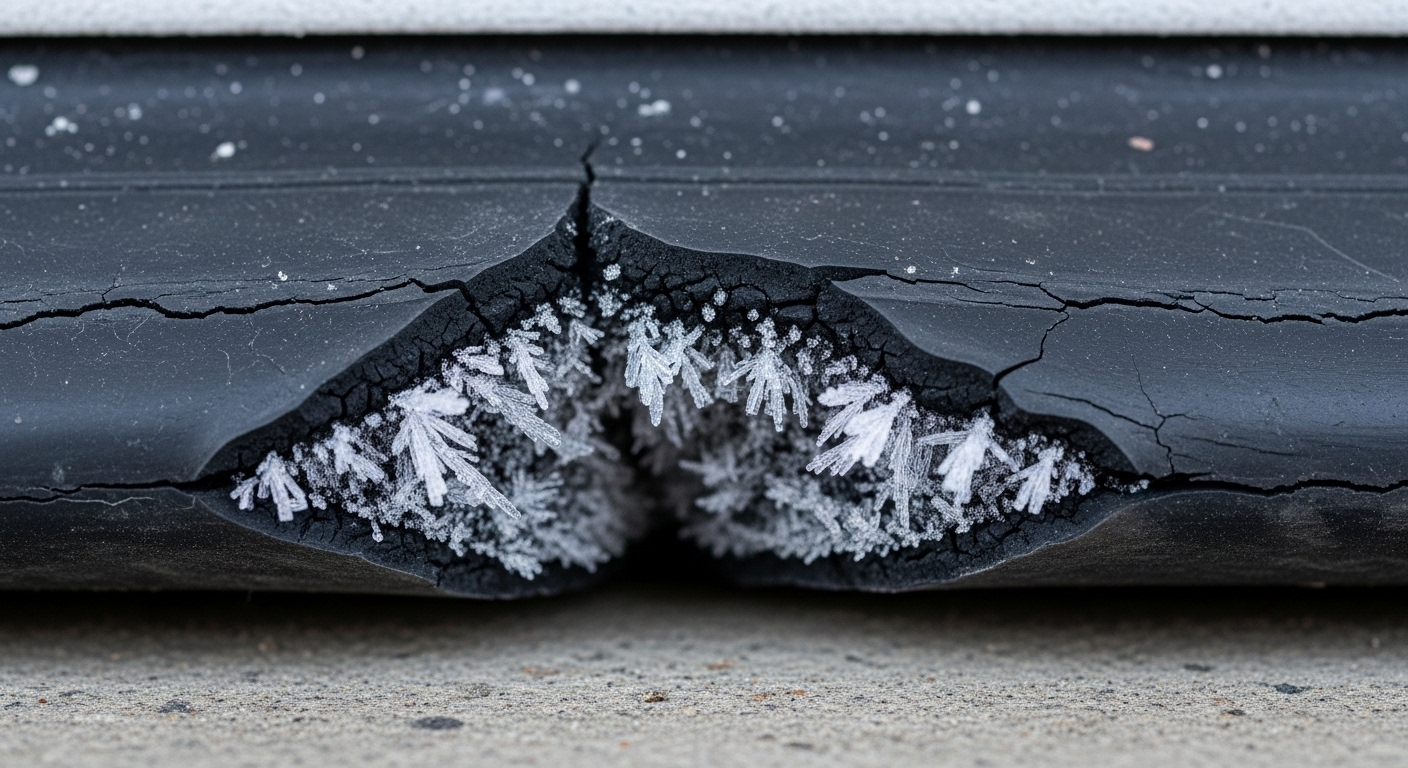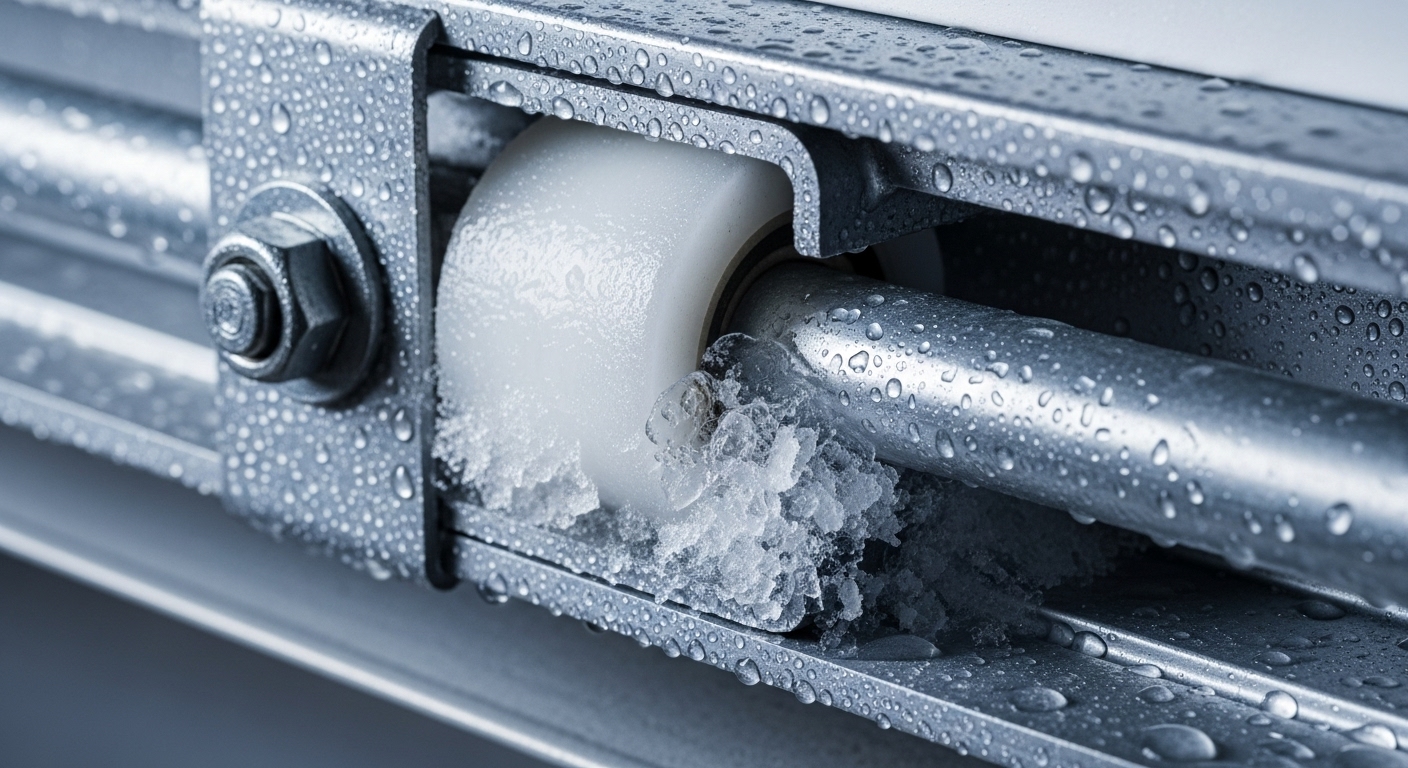Why Your Vancouver Garage Door Keeps Freezing Shut During Winter and How to Prevent Ice Damage
Dealing with a garage door that’s frozen solid to the ground on a chilly Vancouver morning? You’re not alone – this frustrating winter problem affects thousands of homeowners across the Lower Mainland, and understanding why it happens is the first step toward preventing costly ice damage to your garage door system.
Picture this: you’re running late for work on a February morning, coffee in hand, only to discover your garage door won’t budge despite repeatedly pressing the remote. The culprit? Ice has essentially glued your door to the concrete, turning your simple morning routine into an unexpected wrestling match with Mother Nature. Vancouver’s unique coastal climate creates the perfect storm for garage door freezing issues, combining frequent temperature fluctuations around the freezing point with high humidity levels that most other Canadian cities simply don’t experience.
[IMAGE PLACEHOLDER FOR IMAGE1]
Unlike cities with consistently cold winters, Vancouver’s maritime climate subjects garage doors to repeated freeze-thaw cycles that can occur multiple times within a single week. This constant expansion and contraction puts tremendous stress on weather stripping, tracks, and mechanical components, while the region’s notorious wet weather creates ideal conditions for ice formation in places you might never think to check. The good news is that most frozen garage door situations are entirely preventable with the right knowledge and a few proactive steps.
Understanding both the immediate solutions for a frozen door and the long-term prevention strategies can save you hundreds of dollars in emergency repair calls during Vancouver’s unpredictable winter months. From proper weather stripping maintenance to smart heating solutions designed specifically for our mild but challenging coastal climate, there are proven methods to keep your garage door operating smoothly even when Jack Frost comes calling.
Key Outtakes:
- Vancouver’s frequent freeze-thaw cycles create unique ice formation patterns that cause garage doors to freeze more unpredictably than in consistently cold climates
- Proper weather stripping maintenance and threshold sealing can prevent 80% of winter garage door freezing issues
- Regular lubrication with silicone-based products is essential as traditional grease hardens in temperatures below freezing
- Immediate manual disengagement and gentle heating methods can safely resolve frozen garage door situations without motor damage
- Preventive winterization measures cost significantly less than emergency repairs and potential opener replacement

Understanding Vancouver’s Unique Winter Garage Door Challenges
Vancouver’s coastal winter climate presents garage door owners with challenges that differ significantly from those faced by homeowners in consistently cold regions like Calgary or Winnipeg. While other cities might deal with steady sub-zero temperatures for months, Vancouver experiences what meteorologists call “maritime winter conditions,” where temperatures frequently hover around the freezing point throughout December, January, and February. This creates a phenomenon known as “wet freeze” conditions that can be particularly devastating to garage door systems.
The repeated freeze-thaw cycles characteristic of Vancouver winters create more stress on garage door components than consistent cold temperatures ever could. When water penetrates into tracks, weather stripping, and mechanical joints during warmer periods, subsequent freezing creates expansion forces that can crack seals, bend tracks, and strain springs. Research from garage door professionals indicates that cold weather can strain garage door springs, leading to breakage, with broken springs being particularly common when doors feel heavy or won’t open after freezing events.
Vancouver’s high humidity levels, often exceeding 80% during winter months, compound these problems by increasing moisture accumulation around garage door components. Unlike dry prairie winters where ice formation is typically limited to visible surfaces, Vancouver’s moisture-laden air allows water to penetrate deeper into garage door assemblies before freezing. This creates ice formation in hidden areas like roller bearings, spring assemblies, and the interior of weather stripping channels where homeowners rarely think to look.

Another contributing factor to doors freezing shut is the high level of humidity that naturally occurs in Vancouver garages during winter months. High garage humidity levels create condensation on metal surfaces that quickly freezes when temperatures drop, creating ice bonds between moving parts that can prevent normal operation.
Even Vancouver’s moderate temperature drops can cause significant metal contraction in garage door systems. Metal contracts in cold weather, so springs and other metal pieces have the potential to seize up during temperature swings that might seem mild compared to other Canadian cities. This contraction can alter the precise tolerances required for smooth garage door operation, leading to binding, unusual noises, and increased wear on mechanical components.
Common Causes of Garage Door Frozen to Ground Issues
The transition from understanding Vancouver’s unique climate challenges brings us directly to the specific mechanisms that cause garage doors to freeze shut. Most homeowners discover these issues at the worst possible moments, but recognizing the warning signs and understanding root causes can help prevent emergency situations from developing in the first place.
The most frequent cause of frozen garage doors occurs when water accumulates along the bottom seal and freezes, creating an ice bond between the door and concrete floor. Most of the time, garage doors freeze due to a buildup of ice along the base of the door, where even small amounts of water can create surprisingly strong ice adhesion. This water can come from various sources including melting snow tracked in on vehicles, condensation from temperature differences, or poor drainage around the garage entrance.
Weather stripping deterioration represents another major factor in garage door freezing problems. The rubber and vinyl materials used in garage door seals are designed to remain flexible in cold temperatures, but Vancouver’s frequent freeze-thaw cycles accelerate aging and cracking. Weatherstripping is vital for keeping out cold air and moisture, however, in winter, this material can become brittle and cracked, allowing water infiltration that leads to ice formation in critical areas.
Track and roller ice buildup creates mechanical problems that can damage garage door openers and strain lifting systems. When ice accumulates in the tracks where rollers travel, it creates resistance that forces the opener motor to work harder than designed. Ice and snow can also block sensors, preventing doors from opening or closing properly, which can trigger safety mechanisms that shut down the entire system.

Vancouver’s unique rainfall patterns before freezing events create what industry professionals call “hidden ice pockets” in garage door tracks. These formations occur when water runs into track channels during rain, then freezes in areas that aren’t visible during standard visual inspections. This hidden ice can cause sudden mechanical failures when homeowners attempt to operate doors that appear clear of obstructions from the outside.
Identifying Early Warning Signs
Recognizing the early signs of impending garage door freezing problems can prevent minor issues from becoming major repairs. Unusual noises during operation, increased resistance when manually lifting the door, or visible ice formation around weather stripping all indicate developing problems that require immediate attention.
Changes in door operation speed, particularly slower closing or hesitation during opening cycles, often signal ice formation in tracks or roller assemblies. Similarly, if the garage door opener light stays on longer than usual or if you hear the motor straining, these symptoms suggest the system is working harder to overcome ice-related resistance.
Condensation patterns on the interior garage door surface can predict freezing problems before they occur. When warm, humid garage air meets the cold door surface, condensation forms and can subsequently freeze during temperature drops, creating ice bonds that prevent normal operation.
Winter Garage Door Ice Problems: Mechanical and Electrical Issues
Moving beyond the basic causes of freezing, we need to examine the serious mechanical and electrical complications that develop when garage doors operate in icy conditions. These problems can transform a simple frozen door situation into expensive repair scenarios that affect multiple system components simultaneously.

Opener motor strain and damage represent the most costly consequences of attempting to operate frozen garage doors. When garage door components freeze together, the automatic opener must generate excessive force to break through ice bonds, leading to premature motor failure. When ice prevents normal door movement,


